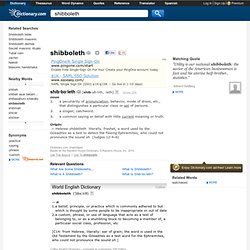

Something Borrowed - English Words with Foreign Origins. Studies suggest that the English language is one of the happiest languages in the world and is spoken by more than 1/4th of the global population.

But, did you know that the second most spoken language in the world (inclusive of native and foreign speakers) is majorly dominated by words derived from the French and Latin language? Well, it is! According to research, words originating from French and Latin make up 29% of the English language respectively!
Additionally, from the 1000 most commonly used words, almost 50% have French origins Some examples of borrowed words from French are RSVP, faux pas, déjà vu, chic, parachute, detour and many more. There are a lot of borrowed words (also known as loan words) in English that come from many languages and cultures. 1. The First English Dictionary, 1604: Robert Cawdrey's Table Alphabeticall, Simpson, Cawdrey. English is one of the most complicated languages to learn, and its constantly evolving vocabulary certainly doesn’t help matters.

For centuries, men and women have striven to chronicle and categorize the expressions of the English language, and Samuel Johnson is usually thought to be their original predecessor. But that lineage is wrong: Robert Cawdrey published his Table Alphabeticall in 1604, 149 years before Johnson’s tome, and it is now republished here for the first time in over 350 years. This edition, prepared from the sole surviving copy of the first printing, documents Cawdrey’s fascinating selection of 2,543 words and their first-ever definitions. Cawdrey subtitled his dictionary “for the benefit of Ladies, Gentlewomen, and other unskilled folk,” for his aim was not to create a comprehensive catalog, but rather an in-depth guide for the lesser educated who might not know the “hard usual English wordes, borrowed from the Hebrew, Greeke, Latine, or French.”
A Barrel of Monkeys: A Compendium of Collective Nouns for Animals, Fanous. Compiled by Samuel Fanous Distributed for Bodleian Library, University of Oxford With a Foreword by Susie Dent and Illustrations by Thomas Bewick 144 pages | 110 halftones | 4 1/2 x 6 3/4 | © 2015 Cloth $17.50 ISBN: 9781851244454 Will Publish November 2015 For sale in North America only What should we call the wild animals we spot from our windows?

Glossary. Agape: Greek for Christian love; contrast with erotic love (eros) or familial love (storge).

Also, communal meals in early Church (love feasts) commemorating the Last Supper. alms: Charitable relief provided to those in need. From Latin eleemosyna, alms; via Greek eleēmosynē, pity or alms, from eleos, mercy, pity, compassion. Shares roots with adj. eleemosynary, meaning charitable, which dates c. 1620. Alms in English dates c. 700. altruism: Unselfishness. Avarice: “Avarice, or the desire of gain,” wrote David Hume, “is a universal passion, which operates at all times, in all places, and upon all persons.” care: From Old English caru, to sorrow, grieve, mourn, or lament.
Nine “corrections” of English that make smart people look silly. “This Underwood built an empire.

Now you go build one of your own,” says Frank Underwood’s father on House of Cards, while giving Frank his portable Underwood typewriter. Founded in 1895, the New York City-based typewriting company produced America’s first popular typewriter. But by 1959, the iconic typewriting manufacturer was no longer in American hands. It had been taken over by the then-leader of the industry, Italian manufacturer Olivetti (link in Italian). Founded in 1908 by electrical engineer Camillo Olivetti, the company was the first Italian manufacturer of typewriters. It wasn’t until 1932, however, that Olivetti became (arguably) the world’s most influential typewriting company, when the founder’s son Adriano Olivetti took over as leader. The Difference Between The Hyphen, En Dash And Em Dash, Explained. Cutthroat compounds in English morphology. A houseboat is a type of boat; a boathouse is a type of house.

This illustrates a common pattern in English morphology: the rightmost part of a compound (houseboat) is usually the ‘head’. In other words it’s the centre or larger category, functionally equivalent to the overall compound, and what precedes it (houseboat) modifies or specifies it. So we say English is ‘right-headed’. But the semantic relationship between the parts can’t be inferred automatically from their arrangement, as this charming/disarming Bizarro cartoon by Dan Piraro shows: Right-headedness is a feature of Germanic languages.
Editor and historical linguist Brianne Hughes studies a remarkable subset of exocentric compounds called agentive and instrumental exocentric verb-noun (V-N) compounds. Cutthroat compounds name things or people by describing what they do. [poster of Robert Bresson’s classic film Pickpocket (1959) via this collection] Cutthroats are freely productive in Romance languages, which have a V.O. Affect vs. Effect Grammar Rules. Knowing when to use affect or effect in a sentence can be a challenge.

These words are examples of homophones, which are words that sound the same, but have different meanings and spellings. Other examples of homophones are two/to/too, accept/except, and there/their/they're. Meaning of Affect and Effect In order to understand the correct situation in which to use the word "affect" or "effect", the first thing one must do is have a clear understanding of what each word means.
Affect is usually used as a verb. Is the letter Y a vowel or a consonant? The letter Y can be regarded as both a vowel and a consonant.

In terms of sound, a vowel is 'a speech sound which is produced by comparatively open configuration of the vocal tract, with vibration of the vocal cords but without audible friction...', while a consonant is 'a basic speech sound in which the breath is at least partly obstructed'. The letter Y can be used to represent different sounds in different words, and can therefore fit either definition. The 100 Most Beautiful Words in English. Source Image source Like this: Like Loading...

Related Create music with words This sentence has five words. In "Writing" 18 Common Words That You Should Replace in Your Writing It’s a familiar scene: you’re slumped over your keyboard or notebook, obsessing over your character. Robyn LaRue. Get the Word of the Day - ides. Get the Word of the Day - obstreperous. Get the Word of the Day - cognoscenti. Get the Word of the Day - divulgate. Jejune - Word of the Day. Get the Word of the Day - tumescent. Alexithymia - Word of the Day. Flummox - Word of the Day. Get the Word of the Day - amphigory. Get the Word of the Day - genesis. Get the Word of the Day - espial. Get the Word of the Day - anomia. Get the Word of the Day - wayworn. Get the Word of the Day - minimax. Get the Word of the Day - donnybrook. Get the Word of the Day - penitent.
Timocracy - Word of the Day. Get the Word of the Day - shibboleth. Bible Dictionary Shibboleth definition river, or an ear of corn.

Get the Word of the Day - too-too. Crackerjack - Word of the Day. Get the Word of the Day - tommyrot. Get the Word of the Day - astraphobia. Get the Word of the Day - ogdoad. Get the Word of the Day - Fata Morgana. Affront - Word of the Day. "… so we repaired to a publick-house, took a friendly glass, and thus parted. " — Peter Drake, Amiable Renegade: The Memoirs of Captain Peter Drake, 1671–1753, 1960 "… Warren repaired to the dining alcove off the kitchen … and ate dinner with Nina and the children, discussing their schoolwork and events of the day. " — Kevin Starr, Embattled Dreams, 2002 We are all familiar with the verb repair used as a synonym of fix.
But today's word, while it is a homograph and a homophone of the more familiar repair, is a slightly older and unrelated verb. Get the Word of the Day - eleemosynary. Get the Word of the Day - helix. A.Word.A.Day. Heliolatry - Word of the Day. Ambisinister - Word of the Day. Get the Word of the Day - argonaut. Get the Word of the Day - polysemy. Chiliad - Word of the Day. Mondegreen - Word of the Day. Get the Word of the Day - psephology. Saturnalia. Aug 10, 2015 This week’s theme Words related to space This week’s words Saturnalia Art: Antoine Callet (1741-1823) A.Word.A.Day with Anu Garg When I find myself unduly worried about something, I look up.
If I had my way, I would make an Astronomy 101 course mandatory for everyone, especially for those running for office. That may not happen any time soon, but a small step would be to replace astrology columns in newspapers and magazines with an astronomy one. PS: For a gentle introduction to astronomy, check out this excellent video series by Phil Plait: Crash Course Astronomy. saturnalia (sat-uhr-NAY-lee-uh) noun: A time of unrestrained revelry. From Latin Saturnalia (relating to Saturn). “It is a sort of holiday, a saturnalia, a time of licence when restrictions on liberty can be cast aside.” See more usage examples of saturnalia in Vocabulary.com’s dictionary. I like the pluralism of modernity; it doesn't threaten me or my faith. Nabob - Word of the Day. Olio - Word of the Day. Get the Word of the Day - entelechy.
A.Word.A.Day. A.Word.A.Day with Anu Garg gehenna (gi-HEN-uh) noun: 1. Hell. 2.